To verify the VIN of a repossessed vehicle in Valley Glen, you'll start by confirming the VIN is visible and matches your documentation—title or registration. Bring all necessary documents, including proof of insurance and a valid driver's license, to your scheduled appointment with a licensed verifier or DMV official. Check the vehicle's odometer and confirm federal safety and emissions labels are intact to avoid issues. Submit the completed REG 31 form to update the registration and maintain accurate records. Handling each step carefully will pave the way for a smoother verification process that confirms compliance and deters potential legal troubles.
Overview of VIN Verification
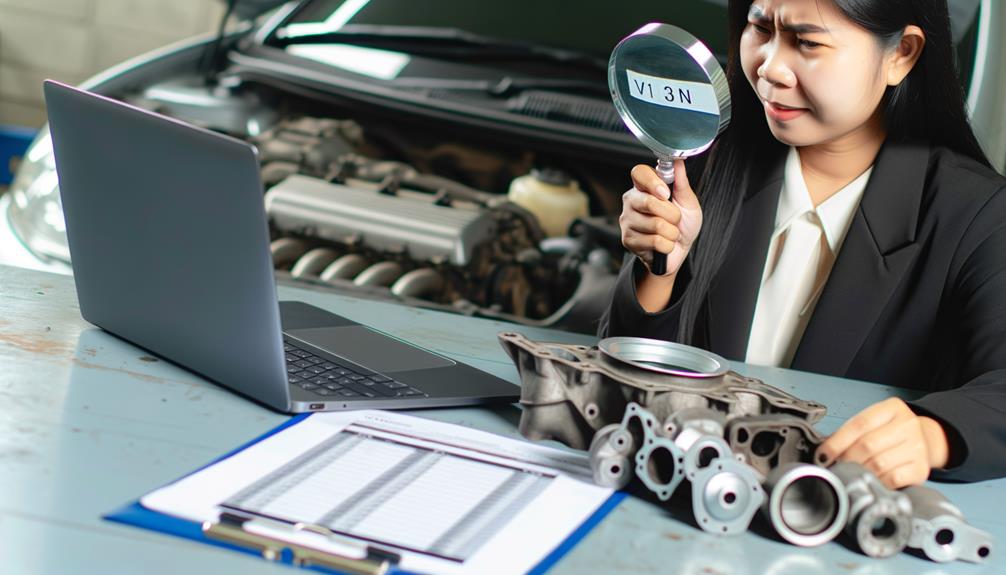
VIN verification is a critical step required by the DMV to guarantee that the Vehicle Identification Number (VIN) on your vehicle matches its official records.
This process is essential not only for your safety but also to prevent fraud and theft, ensuring that the vehicle you're dealing with is legally verified and registered under correct credentials.
During a VIN verification, a physical inspection is conducted which is documented on the REG 31 form. This includes checking the VIN against the California DMV's records and verifying compliance with federal safety and emissions standards.
It's crucial for confirming the identity of repossessed vehicles, out-of-state transfers, or when there are discrepancies in your vehicle's documentation.
Authorized personnel like DMV employees, California Highway Patrol (CHP) officers, and licensed private verifiers play a pivotal role in this process.
Each offers a unique set of services, and private verifiers may charge a fee.
The inspection acts as a gatekeeper in the registration process, ensuring that no stolen or illegally owned vehicles slip through the cracks.
Required Documentation
To begin the VIN verification for your repossessed vehicle in Valley Glen, you'll need to present the original vehicle title or the registration documents that display the VIN. This step is essential as it confirms the vehicle's identity and guarantees that all subsequent documentation matches this primary source.
Next, gather your supporting documents. These might include a bill of sale or any previous registrations that establish your claim of ownership. This paperwork is necessary not only for verifying ownership but also for aligning with DMV requirements.
Make sure these documents are accessible and organized to expedite the verification process.
Additionally, if you're dealing with a vehicle that was recently imported or is being registered in California for the first time, you might need to undergo emissions compliance verification, which guarantees your vehicle meets specific environmental standards set by the state.
Finally, you're required to show proof of current insurance and a valid driver's license. These pieces of identification are necessary to confirm your identity and legal ability to operate the vehicle.
It's important to make certain that your insurance coverage is active and that your driver's license is valid at the time of verification.
Preparing Your Vehicle
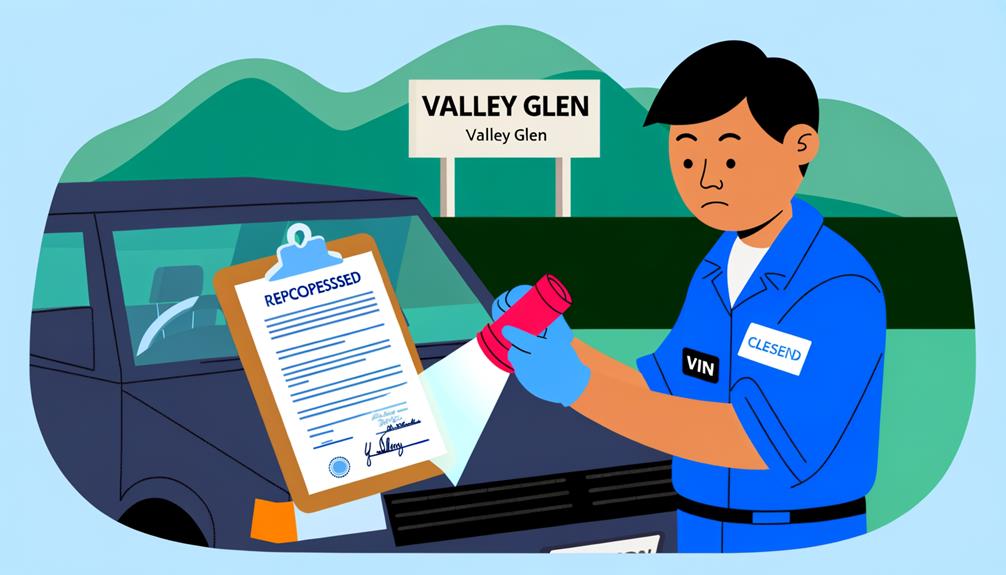
After gathering all the necessary documents as outlined, your next step involves preparing your vehicle for the VIN verification process. It's essential to guarantee the vehicle identification number (VIN) on your vehicle is clearly visible and matches the vehicle title and registration documents. Any discrepancies between these can lead to significant issues during verification.
Start by cleaning and organizing the areas around the VIN locations, typically found on the dashboard and the driver's side door frame. This not only promotes safety but also facilitates an easier inspection process by the California Highway Patrol (CHP). Confirming these areas are unobscured makes the VIN easy to access and verify.
Next, check your odometer reading to confirm it reflects the true mileage. An accurate odometer reading is important as inconsistencies can raise suspicion and potentially hinder the verification process.
Also, verify the presence of all required federal safety and emissions labels. Missing labels can impede the verification process, as they're fundamental for proving your vehicle's compliance with safety and environmental standards in California.
Inspection Points
Understanding the inspection points is essential when preparing for VIN verification of a repossessed vehicle. You'll need to guarantee the VIN is visible and in good condition on both the dashboard and the driver's side door frame. This is critical as it must match the details on the title documents exactly.
During the inspection, the verifier will also confirm the odometer reading to check the true mileage. This step is imperative to identify any potential discrepancies that might suggest tampering. Make sure that the mileage reported aligns with the vehicle's condition and usage history.
Additionally, all repossessed vehicles must have the required federal safety and emissions labels intact to comply with California regulations. These labels are essential for proving that your vehicle meets necessary environmental and safety standards.
Furthermore, the verification process involves documenting the vehicle's year, make, model, and body type. It's important that these details correspond precisely with the ownership and registration paperwork you provide.
Any inconsistencies between these records and the VIN or odometer reading can lead to delays or require further investigation to resolve the discrepancies.
Common Verification Issues
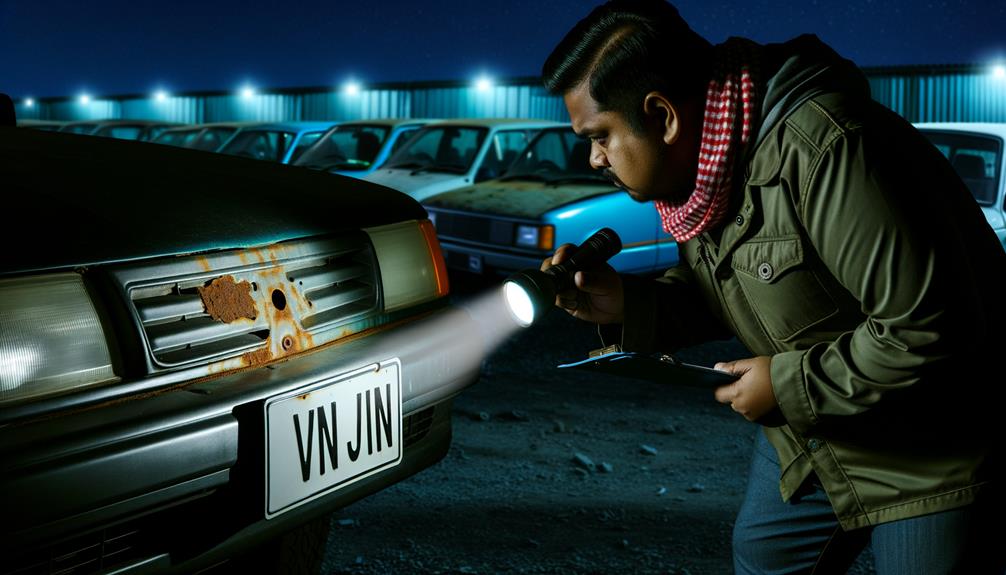
Common verification issues often arise when repossessing vehicles, complicating the registration process. You might encounter discrepancies between the VIN displayed on the vehicle and the one listed in the title records. These mismatches can flag potential fraud or clerical errors, necessitating further scrutiny during the VIN verification process.
Additionally, if the federal safety and emissions labels are missing or damaged, you're looking at possible delays. These labels are essential as they confirm the vehicle meets necessary safety standards. Without them, extra inspections might be needed to guarantee the vehicle's compliance with safety regulations.
Odometer discrepancies are another common hurdle. If the mileage on the odometer doesn't match up with what's documented, it could suggest tampering, calling the vehicle's history into question. This could potentially escalate into a legal issue, emphasizing the need for meticulous verification.
Moreover, incomplete paperwork, such as missing REG 31 forms or other important documents, can stall the process. Confirming all paperwork is complete and accurate is critical to a smooth verification and registration process.
Lastly, remember that vehicles classified as revived salvage or previously junked can't undergo standard VIN verification, limiting your registration options for these repossessed vehicles. Always verify the vehicle's status early in the process to avoid unnecessary complications.
Verification Costs
While dealing with the challenges of verifying the details of a repossessed vehicle, it's also important to contemplate the costs involved.
In Valley Glen, the costs associated with VIN verification can vary considerably. If you opt for private verifiers, you're looking at fees ranging from $45 to $97, based largely on service complexity and your specific location. This choice might be quicker, but it's certainly not the cheapest.
Alternatively, DMV verification services offer a cost-effective solution since they provide free verification, provided you have all the necessary documents.
However, when considering private verifiers, remember they're authorized to complete the REG 31 form, which is essential for ensuring your vehicle's compliance with state regulations.
If you need mobile VIN verification, be prepared for additional travel charges which will add to your total expense.
Also, the urgency of your situation and the scheduling of an appointment can affect your costs. In high-demand areas like Valley Glen, expedited services may be more expensive due to the high volume of requests.
Always weigh the convenience against the potential costs to find the best service option for your needs.
Choosing a Provider
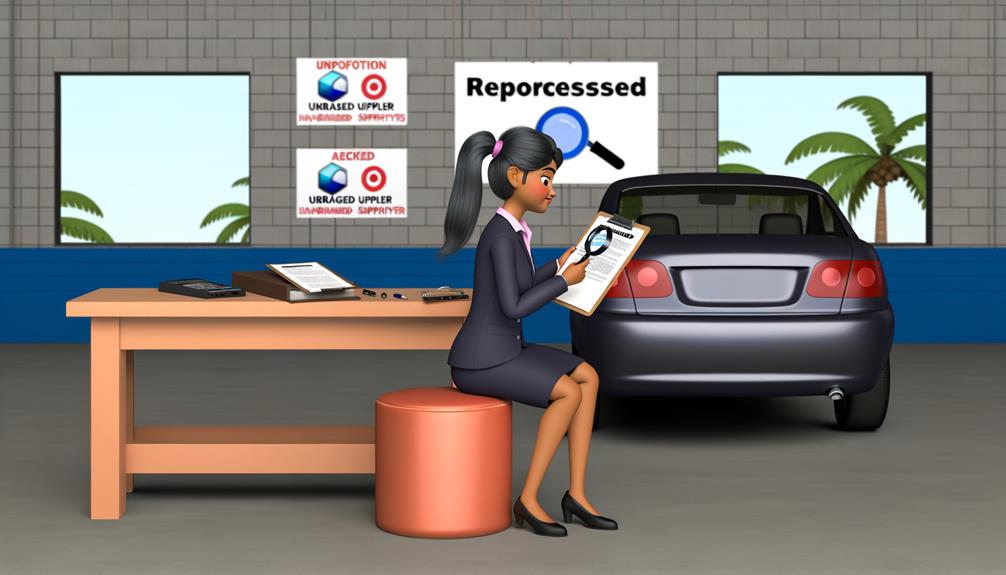
Selecting the right VIN verification provider is vital, especially when dealing with repossessed vehicles in Valley Glen. You'll need a provider that's not only licensed to complete the REG 31 form but also has a deep understanding of the specific documentation requirements for these vehicles.
Confirm the verifier is authorized and well-versed in the complexities that might crop up during the verification process.
Look for a provider that offers mobile services, which can be a huge benefit if your repossessed vehicle isn't readily mobile. However, be aware that some might charge extra for this convenience. It's important to check if these costs are justified based on your specific needs.
Don't underestimate the power of customer feedback. Providers with positive reviews are often more reliable and likely to offer the quality of service you need. This feedback can be a vital indicator of their professionalism and the smooth handling of VIN verification.
Lastly, compare the costs. While the DMV provides free verification, private verifiers charge a fee. Weigh these options considering what additional value private verifiers might offer, particularly those experienced with repossessed vehicles.
Opting for a specialized, yet affordable, service guarantees safety without compromising on quality.
Scheduling the Verification
Why wait? Scheduling the VIN verification for your repossessed vehicle in Valley Glen is a straightforward process that guarantees the safety and legality of your vehicle.
First, contact the DMV or an authorized verifier to set up an appointment. Remember, walk-ins might leave you waiting, so it's wise to book in advance.
Before making the call or sending that email, gather all necessary documentation. You'll need the vehicle title, proof of ownership, and any lien release documents. Having these at hand during scheduling will smooth the process, letting the verifier know you're prepared and serious about compliance.
When setting up your appointment, you have options: phone, online, or email. Choose what's most convenient for you.
Also, verify the payment methods accepted by your chosen verifier—be it cash, checks, or digital payments. This way, you'll avoid any surprises on the day of the inspection.
Make certain your repossessed vehicle is accessible for the inspection. The verifier will check the visible VIN, odometer readings, and compliance with federal safety and emissions labels.
This thorough inspection is essential for your peace of mind and the vehicle's future usability.
Post-Verification Process
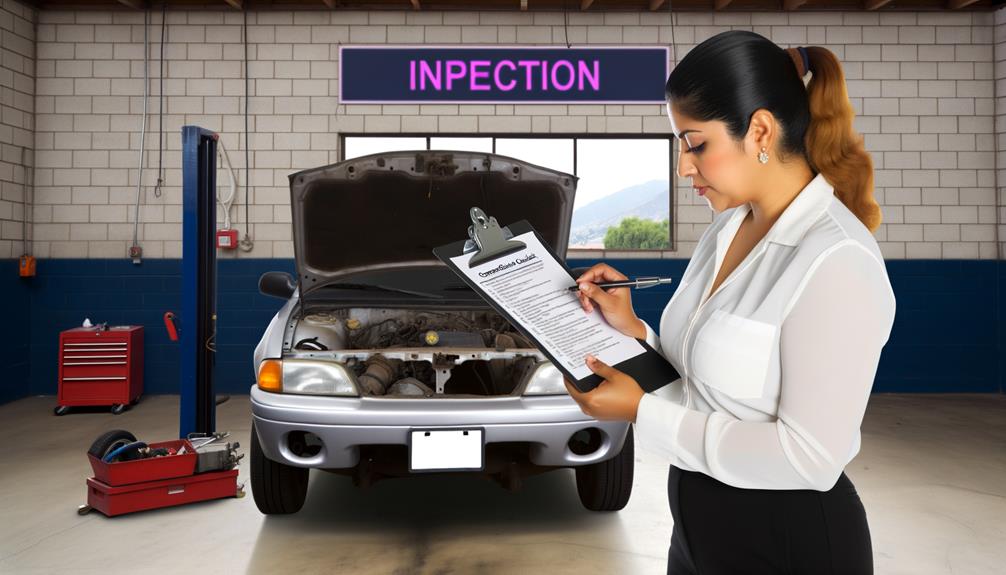
Once your vehicle's VIN verification is complete, you'll need to promptly fill out and submit the REG 31 form to the DMV to update your registration details. This step is vital as it guarantees the DMV has the most current information about your repossessed vehicle, helping avoid any legal or administrative issues down the road.
Make sure to keep a copy of the filled REG 31 form; it's your proof that the VIN verification was conducted and might be necessary if disputes or inquiries arise.
Next, you must address any modifications or discrepancies found during the VIN verification. Report these changes immediately to the DMV to maintain accurate vehicle records. This attention to detail will safeguard you against potential complications.
Additionally, before you can retrieve your vehicle, check that all outstanding fees or payments have been settled with the finance company. This is fundamental to guarantee a smooth and undisputed recovery of your vehicle.
Frequently Asked Questions
Who Is Authorized to Do a VIN Verification in California?
You can have VIN verifications done by DMV employees, CHP officers, certified private verifiers, or auto club employees like AAA, excluding salvage vehicles. Ascertain any private verifier is authorized to avoid registration issues.
How Much Does It Cost to Verify a VIN Number in California?
To verify a VIN number in California, you'll pay between $45 and $97. DMV does it for free with all documents. AAA charges vary for members. Mobile services might add travel costs.
What Is a Reg 31 Form?
A REG 31 form is what you'll use to report a vehicle's VIN inspection results in California. It guarantees the VIN matches title records, essential for confirming the car's identity and preventing fraud.
Can CHP Do a VIN Verification?
Yes, you can have the CHP conduct a VIN verification. They're equipped to handle cases involving discrepancies, salvage, or out-of-state vehicles. Just remember to book an appointment at your local CHP office first.







